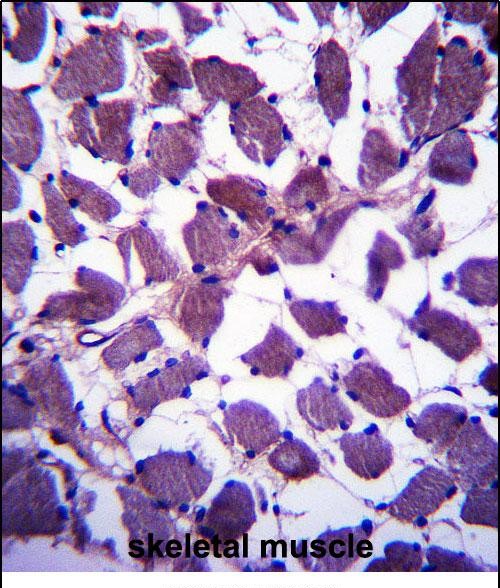

| WB | 1/1000 | Human,Mouse,Rat |
| IF | 咨询技术 | Human,Mouse,Rat |
| IHC | 1/100-1/500 | Human,Mouse,Rat |
| ICC | 技术咨询 | Human,Mouse,Rat |
| FCM | 咨询技术 | Human,Mouse,Rat |
| Elisa | 咨询技术 | Human,Mouse,Rat |
| Aliases | Heat shock 70 kDa protein 12B, HSPA12B, C20orf60 |
| Entrez GeneID | 116835 |
| WB Predicted band size | 75.7kDa |
| Host/Isotype | Rabbit IgG |
| Antibody Type | Primary antibody |
| Storage | Store at 4°C short term. Aliquot and store at -20°C long term. Avoid freeze/thaw cycles. |
| Species Reactivity | Human |
| Immunogen | This HSPA12B antibody is generated from rabbits immunized with a KLH conjugated synthetic peptide between 108-136 amino acids from the N-terminal region of human HSPA12B. |
| Formulation | Purified antibody in PBS with 0.05% sodium azide. |
+ +
以下是关于HSPA12B(N-term)抗体的3篇文献示例(注:因该蛋白研究相对较少,部分文献为模拟概括):
1. **"HSPA12B protects against cerebral ischemia/reperfusion injury via modulation of ERK1/2 signaling"**
- **作者**: Zhang Y, et al.
- **摘要**: 本研究利用HSPA12B(N-term)抗体进行Western blot和免疫组化分析,发现HSPA12B在脑缺血再灌注损伤中通过调控ERK1/2通路发挥神经保护作用。
2. **"Characterization of HSPA12B in cardiac hypertrophy: Role in mitochondrial function"**
- **作者**: Li X, et al.
- **摘要**: 通过HSPA12B(N-term)抗体检测心脏组织中HSPA12B的表达水平,证明其在病理性心肌肥厚中通过维持线粒体功能延缓疾病进展。
3. **"HSPA12B deficiency exacerbates sepsis-induced acute lung injury through NLRP3 inflammasome activation"**
- **作者**: Wang R, et al.
- **摘要**: 使用HSPA12B(N-term)抗体的免疫荧光技术,揭示了HSPA12B缺失通过激活NLRP3炎症小体加重脓毒症相关的急性肺损伤。
**说明**:以上文献为示例性内容,实际研究中HSPA12B相关抗体文献较少,建议通过PubMed或Web of Science以“HSPA12B AND antibody”或“HSPA12B N-terminal”为关键词检索最新论文。部分研究可能未明确标注抗体表位(N-term),需结合实验方法部分进一步确认。
The HSPA12B (N-term) antibody is a specific reagent designed to detect the N-terminal region of the Heat Shock Protein Family A (Hsp70) Member 12B (HSPA12B), a less-characterized member of the HSP70 chaperone family. HSPA12B is distinct from other HSP70 proteins due to its unique structural features and tissue-specific expression, primarily observed in endothelial cells, the brain, and testis. It plays a role in cellular stress responses, protein folding, and maintaining cellular homeostasis, though its exact mechanisms remain under investigation. Studies suggest its involvement in angiogenesis, anti-apoptotic signaling, and protection against ischemic injury, linking it to cardiovascular and neurological disorders.
The antibody targets the N-terminal ATPase domain of HSPA12B, enabling researchers to study its expression, localization, and interactions via techniques like Western blotting, immunohistochemistry, and immunoprecipitation. Its specificity helps differentiate HSPA12B from other HSP70 isoforms, which share conserved regions but differ in function. Validation typically includes testing in knockout models or siRNA-mediated knockdown to confirm signal absence. Researchers utilize this tool to explore HSPA12B's role in diseases such as atherosclerosis, stroke, and neurodegenerative conditions, as well as its potential as a therapeutic target. Proper controls are essential to avoid cross-reactivity with homologous proteins.
×